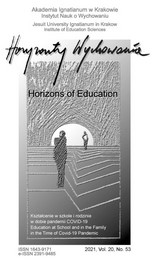Samoocena i jej związek z satysfakcją z życia młodych dorosłych osób z porażeniem mózgowym
Self-esteem and its Relationship with Satisfaction with Life in Young Adults with Cerebral Palsy
Author(s): Grażyna Aondo-AkaaSubject(s): Gender Studies, Cognitive Psychology, Psychology of Self, Evaluation research
Published by: Uniwersytet Ignatianum w Krakowie
Keywords: self-esteem; satisfaction with life; cerebral palsy; motor disability; early adulthood;
Summary/Abstract: RESEARCH OBJECTIVE: The main objective of this publication is to define the relationship of self-esteem and satisfaction with life in young adults with cerebral palsy THE RESEARCH PROBLEM AND METHODS: The main research problem is a question: What is the relationship of self-estem and satisfaction with life among young adults with cerebral palsy? The research was designed using quantitative strategy and diagnostic survey method. The following tools were used to carry out the research: The Rosenberg Self-Esteem Scale (SES) in polish adaptation of Łaguna, Lachowicz-Tabaczek and Dzwonkowska and Satisfaction With Life Scale in the authorship of Diener, Emmons, Larsen and Griffin, in polish adaptation of Juczyński THE PROCESS OF ARGUMENTATION: The statistical analysis was carried out, using descriptive statistics method and following parametric tests: correlation analysis using r-Pearsons’s coefficient and analysis of differences using t-Student test. RESEARCH RESULTS: The level of self-esteem and satisfaction with life in young adults with cerebral palsy is congruent with level of these variables in polish population. Gender does not modify significantly the level of self-esteem and satisfaction with life in young adults with cerebral palsy. The relationship of self-esteem and satisfaction with life is significant only in women with cerebral palsy. CONCLUSIONS, INNOVATIONS, AND RECOMMENDATIONS: Gender modifies relationship of self-esteem and satisfaction with life. This knowledge should be broadened and included in education and psychological rehabilitation.
Journal: Horyzonty Wychowania
- Issue Year: 19/2020
- Issue No: 52
- Page Range: 23-33
- Page Count: 11
- Language: Polish

